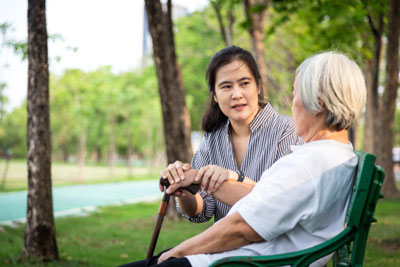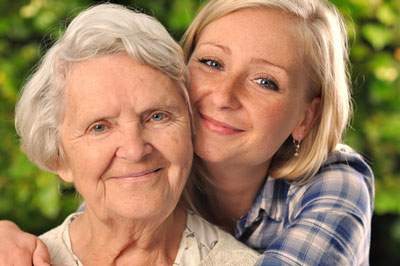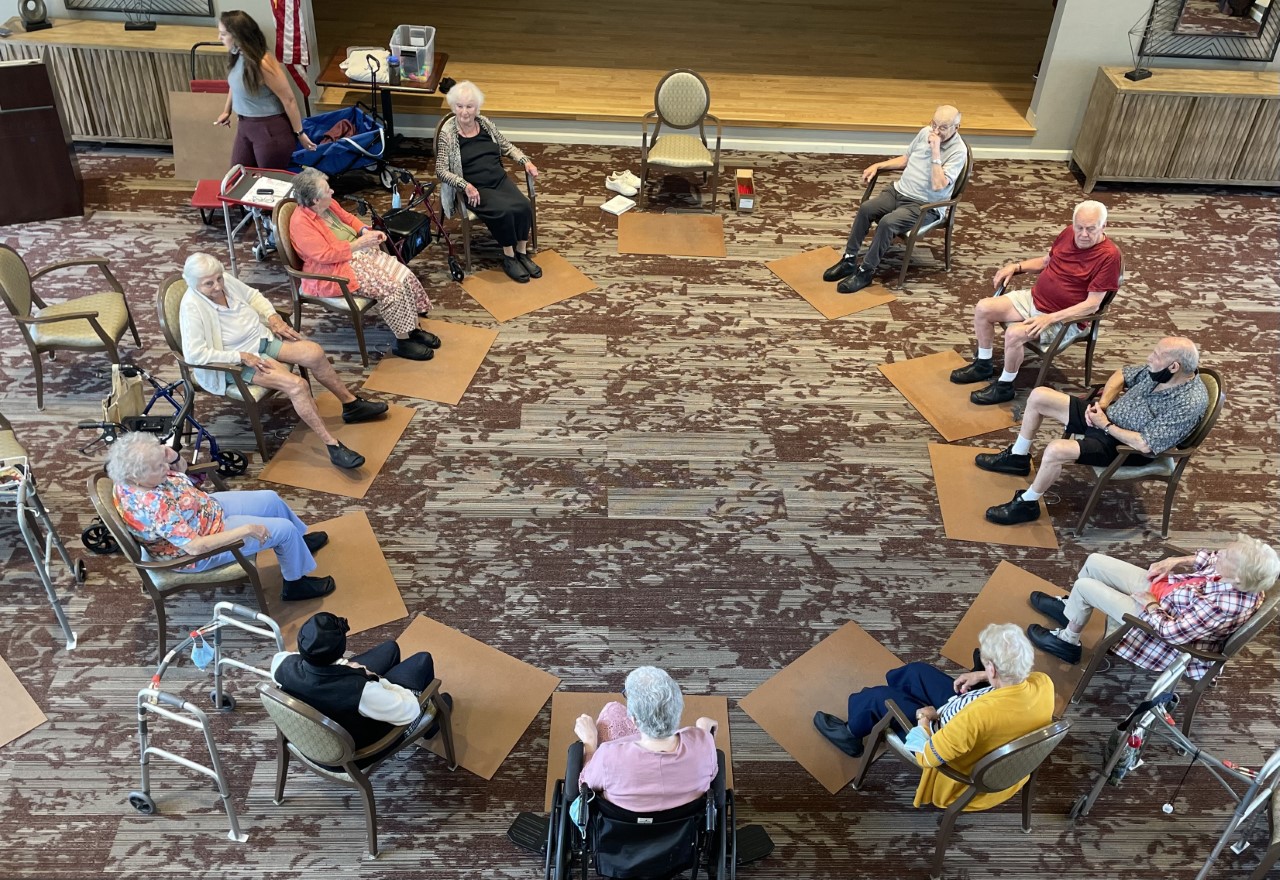We’re living longer, healthier lives and adults are often finding themselves caring for loved ones, including children and parents at the same time.
Few of us expected to be taking care of our parents or other seniors as they (and we) aged, but that’s a reality these days for an increasing number of adults. Many of us are members of the “sandwich” generation, as we simultaneously care for children as well as one or more parents. As loved ones begin to depend on their children for care, roles are reversed, emotions often increase, and stress results for all involved.
Ill health can further complicate an already challenging environment. Finding ourselves helping our parents and elders make important life decisions — or having to make those decisions for them — brings great responsibility. What do you do? How do you help your loved one and keep your own life on track?
Are You Caring for a Loved One?
As we start to offer more support to our loved one, we might lose sight of the overall path and not realize that we have become more and more integral to the life and needs of our parent or elder, perhaps even assuming caregiver responsibilities.

Caregiver Defined
Caregivers include nurses, aides, social workers, and support staff in the office, and also individuals inside your family or community. The person being cared for may only need this type of assistance for a short time or for the rest of their life. A caregiver is someone who:
- Provides assistance to another person who cannot perform activities such as:
- Personal care
- Every day home management
- Daily tasks on a regular basis
- Is paid or unpaid
- Resides in the person’s home or manages things from a distance
Caregiving is not easy. It requires us to be our best selves in trying circumstances. You are a caregiver if you:
- Take care of someone who has a chronic illness or disease
- Manage medications or talk to doctors and nurses on someone’s behalf
- Help bathe or dress someone who is frail or disabled
- Take care of household chores, meals, or bills for someone
- Make the decisions for your loved one
- Organize care and support over the phone
Caregiver Statistics
According to the National Alliance for Caregiving and the American Association of Retired Persons (AARP), more than 34 million Americans serve as caregivers for an aging parent or another person every year. On average, family members who are caregivers are 49 years of age with women accounting for 60% of the total and men 40%.
Did You Know?
Get some tips on how to care for a loved one in an emergency.
Impact of Caregiving for a Loved One on Your Life
Each day you are blending routines and creating time tables to make the day work for everyone. And just when you think you have it all figured out, an emergency occurs to disrupt the schedule and challenge your expectations as you rush to care for your loved one.

Caregiving for an older adult, especially a parent, is hard. It is perhaps one of the most emotionally challenging experiences many face. As a caregiver, you must balance the demands of your own life, career, and family against the needs of the person you are caring for, which can impact all aspects of your health including your:
- Physical wellness resulting in physical exhaustion, sleeplessness, health problems from poor diet, lack of exercise, and self-neglect;
- Emotional wellness including anger, guilt, stress, anxiety, depression, social isolation, irritability, and lack of concentration; and
- Financial wellness resulting from missed work, more expenses, and increased time constraints.
What You Can Do For Your Loved One
Your support is making a huge difference in your parent’s or another senior’s life. As you start down the path of becoming a caregiver, make sure you formulate a plan to support all the needs of your loved one. Here are some steps you can take.
- Schedule a family meeting – Make sure close family and friends know what is going on. Discuss the caregiving goals and appoint someone to summarize the decisions you make. Divide up duties and be sure to involve your loved one in the process.
- Become well-informed – Talk to your parent’s or other loved one’s doctors and nurses and do some research to learn more about the medical situation. Ask about the course of any illnesses, what you can do to prevent crises, and how to assist with the management of any disease.
- Be organized – Take the time now to make sure you have all the information you may need in the future.
- Make lists of family members, friends, and neighbors with phone numbers and email addresses. Name those who are to be contacted in case of emergency and note individuals who can easily check-in on your loved one. All family caregivers and your loved one should have a copy of this contact list.
- Locate information about insurances – health and life, homeowners, and auto insurance. Know when premiums are due, how they are paid, and where policies are located.
- Keep a record all providers, including pharmacy, medical specialists, visiting nurses, health care aides, housekeeper, clergy, and anyone else who is providing a service to your loved one.
- Stay in touch with providers – Schedule calls with health care providers to keep on top of changes in your loved one’s health. Have your parent sign a release allowing the doctor to discuss medical issues with you. Obtain permission to view online medical records so you can see test results, medications, after-visit summaries, and physician recommendations.
- Execute a medical power of attorney – Your loved one will make final health care decisions unless a medical power of attorney has been named. This advance directive should be written and include legal instructions regarding preferences for medical care. A medical power of attorney (or health care proxy) stipulates health care decisions when a patient can no longer do so.
Long-Distance Caregiving for a Loved One
In this day and age, it’s not surprising for people to be geographically dispersed and to not live in close proximity to their parents or other loved ones. Although in this case it might not be possible to assist with certain day-to-day aspects of hands-on caregiving, there is still much you can do. You can provide care and assistance from a distance including coordinating in-home care, managing medical bills or records, and arranging respite care or emotional support to a primary caregiver.
- Stay in touch – Be in communication with your loved one’s friends and neighbors. Ask them to check in and visit with them on a regular basis and then to provide you updates on current health status.
- Did you know? In some communities, mail carriers or utility workers are trained to spot signs of trouble through the Carrier Alert Program of the U.S. Postal Service. They report concerns, such as accumulated mail or trash, to an agency that will check on the older adult. To find out if there’s a program in your area, contact your local post office or National Association of Letter Carriers (NALC) branch office, or ask your mail carrier for information.
- Hire professional help – If needed, hire someone to assist with meal preparation, personal care, shopping, or other needs. A geriatric care manager or social worker can also help to organize and provide for care. For example, SALMON Private Care Options provides home health aides who can assist with these tasks.
- Maintain connection – Although you may not be able to be there in person, you can do other things to show you care. Send digital movies, photographs, or cards. Establish a weekly call-in or video chat with your loved one.
- Plan for emergencies – If you live far away, be sure to set aside money for travel expenses in case an emergency visit is required. Accrue vacation time if necessary. Consider taking unpaid leave under the Family and Medical Leave Act.
- Make the most of visits – Find out ahead of time what your loved one needs in the way of tasks-to-be-accomplished when you are visiting.
- Schedule appointments with doctors and the dentist for when you are visiting, with your loved one’s permission. You may also want to schedule an appointment with your loved one’s attorney.
- Watch carefully for any signs of problems with managing daily tasks. Is there sufficient food in the refrigerator and pantry? Is your loved one having difficulties driving and navigating? Are bills being paid on time?
- Spend quality time together. Do simple activities that your loved one enjoys – and enjoy your time with each other.
What You Can Do for Yourself
First you need to accept that you are a caregiver, which means recognizing you can experience a variety of challenges from your role. Investing in self-care before burnout sets in will allow you to stay healthy and be there for your loved ones when they need you most. Here are some tips:
- Maintain your own health – Follow up with your doctor on a regular basis. Investing in your own health needs to be a priority for the benefit of your whole family. Stick to your preventive care, and don’t ignore symptoms or signs something may be wrong. Also, mind your own emotional health. You cannot adequately care for someone else if you are not well, physically or emotionally. Let go of guilt.
- Schedule ‘me‘ time – Make a plan for how to manage your job and caregiving, and plan breaks for relaxation and exercise. Staying physically active will help to manage your stress and keep you energized. It can also clear your thoughts and process your feelings in a healthy way.
- Set an alarm, and step away to meditate or quietly unplug and read a novel or magazine for as little as 15 to 20 minutes a day.
- Practice relaxation exercises or meditation techniques daily. Start by taking a few deep breaths and work from there.
- Connect with friends – Caregivers need a network of supportive friends and community. Your friends can be the best outlet and source of help and encouragement in a difficult time. Keeping perspective as we care for others is another important aspect of caregiving.
- Join a caregiver support group – Becoming part of a support group connects you with a diverse group of people who are in a similar situation, and provides you with the freedom and anonymity necessary to adequately voice your feelings and concerns without fear of judgment. Groups typically meet monthly and provide support and guidance in a confidential setting. Caregiver support groups are a great source of useful information, provide emotional support, and help reduce anxiety, stress, and social isolation.
- SALMON Health and Retirement offers free support groups for the public on their Natick, Northborough, Northbridge, Sharon and Westborough campuses.
- Get enough sleep – Most adults do not get enough sleep. Busy caregivers are at an especially high risk of insomnia and sleep deficit. If you indulge in one act of self-care, getting enough sleep should be at the top of the list.
- Consider respite care – Respite care provides professional services for caregivers who need a break or support in taking care of another person. From skilled nursing and home care services to temporary assisted living for seniors so you can take a short break to recharge, respite care can support your needs and the needs of your loved one.
When Caring for a Loved One who is an Older Adult Becomes More Than You Can Handle

Caregiver Stress Resources
- Learn why it is important to take care of yourself and how to do it
- Get caregiving stress management tips
- Learn about caregiver burnout
Sometimes as your loved one is needing more and more support, you reach the point where you have to start looking for other caregiving options. If that time comes, remember to include your parent or elder in the conversation and decision making. As far as it is practical, let them make the decisions about their own care.
Know that there are options. Your needs will direct the search to find the best fit for both that person and your family. Assessments by health professionals, geographical location, physical and medical needs, preferences, lifestyles, and financial matters will all play a part in the final selection.
The adult living settings available include:
- Adult Day Care – An adult day care center is non-residential with support for the health, nutritional, social, and daily living needs of adults in a professionally-staffed, group setting on weekdays. Most adult day care centers provide meals, meaningful activities, and general supervision. Adult day care is especially helpful for caregivers who are caring for someone with dementia.
- Home Care – Home care can include several types of services, delivered in a person’s home setting.
- Visiting Nurses Associations (VNA) work with physicians to provide patients with rehabilitation, nursing, social services, and specialized care.
- Home Care Agencies can offer home health aides to help with activities of daily living.
- Hospice care provides a professional, interdisciplinary team devoted to optimizing the remainder of a terminally ill patient’s life.
- Assisted Living Communities – Designed for older adults for whom some level of care less than nursing is needed, assisted living communities offer a wide range of services. Communal meals are offered, but apartments may also include kitchen facilities. Housekeeping, amenities, activities, and supervision round out a secure living plan.
- Skilled Nursing Care – Some older adults require medical care and supervision with 24-hour nursing. Skilled nursing may be temporary for rehab or more long-term, where independent living or assisted living is no longer feasible.
- Memory Care – Many older adults benefit from the supervision, stimulation, safety, and specialized care found in a community residence offering what are called “memory care” programs. Memory care is for people living with memory loss, dementia, or Alzheimer’s disease, and can often be found in assisted living communities and skilled nursing centers.
- Continuing Care Retirement Communities (CCRC) – CCRCs are where a “continuum” of care needs – from independent living to assisted living and skilled nursing care – can be met. The emphasis of the CCRC model is to enable residents to stay within the same environment if and when their needs change and a higher level of care is required.
Caring for loved ones and keeping yourself healthy in the process comes with many rewards and challenges, and stepping back to examine your evolving situation from time to time is wise.




